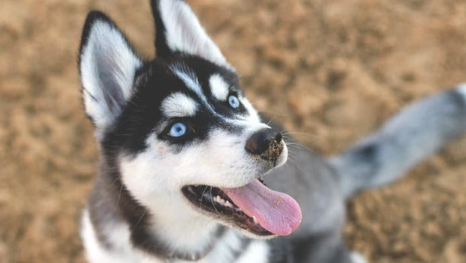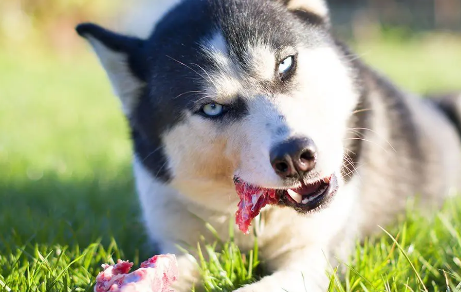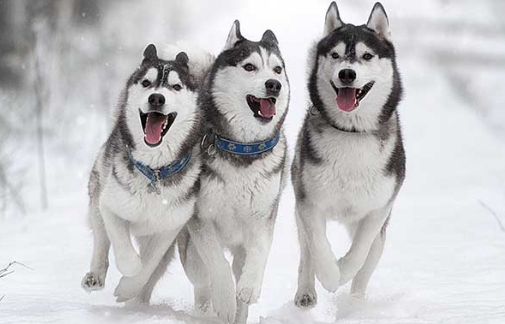As a husky owner, I expect to get into “arguments” with my dog on a regular basis. I know I’m in for a lengthy conversation if I order her to get out of bed or to put her sister’s bone down.
Huskies are frequently referred to as drama queens online and in dog communities. You might be wondering why huskies are so dramatic, whether you’ve seen videos of these mischievous dogs having tantrums go viral or you have one of your own.
Huskies are dramatic due to a combination of genetic traits and human feedback. As a naturally vocal and stubborn breed, huskies are genetically predisposed to communicate vocally when they don’t want to do something or are feeling something strongly. Huskies engage in more of this dramatic behavior because people reward it with attention.
This article will discuss why huskies are dramatic, the origins of their distinctive personalities, and how to curb your dog’s tendency toward excessive theatrics.
Table of Contents
How Are Huskies Dramatic?
Huskies are an unusually expressive breed, but the thing that truly distinguishes them from similarly reactive dogs is that they show their emotions loudly. A scared husky will “scream,” a sad husky will howl, a frustrated husky will grumble, and an excited husky will often “talk.”
Husky owners often refer to their dogs as the “drama queens of the dog world” when they talk about the loud, theatrical ways that huskies express themselves when they can’t have their way. Although the specifics of these “husky tantrums” can vary from dog to dog, it’s important to distinguish them from genuinely problematic behaviors.
What Are Husky Tantrums?
When a husky wants something and is told they cannot have it, they aren’t afraid to show their frustration. The best way to explain what these tantrums are like is to just show you one:
As you can see, a husky throwing a tantrum will vocalize loudly by barking, howling, whining, and making other odd noises. Often, this is accompanied by stomping, staring, and pacing. Huskies frequently lay down and won’t get up or look at their owner. Of course, these behaviors tend to become more extreme the more their humans engage with husky throwing tantrums!
How Huskies Show They Are Upset Or Scared
It’s uncommon for something to frighten huskies because of their adaptable and outgoing nature. However, a scared husky will scream, thrash, and wail like their lives depend on it when that strange thunderstorm strikes or a trip to the vet is necessary! For instance, the dog below is clearly not enjoying getting groomed.
Displays of fear like this may be unintentionally funny for the average bystander, but it’s important to desensitize dogs toward their fears.
How Huskies Show They Are Excited
Like all dogs, huskies enjoy seeing their owner return home at the end of the day. They might leap up and place their paws on your shoulders, wag their tail vigorously, circle around, and lick your hands and face. Furthermore, since huskies make a variety of noises, from howling to whining, you should anticipate this from your dog. In the case of my husky, she does her best to say “I love you!”
What Shouldn’t Count as Being Dramatic
Most of the time, huskies are lovingly referred to as dramatic. When a husky is anxious, it may act in ways that are annoying at best or occasionally wailing or protesting.
However, inexperienced husky owners frequently report genuinely troubling and maladaptive behaviors. Huskies who do not receive the proper care or training frequently struggle with separation anxiety and destructiveness because they are such intelligent and quick-thinking animals. As the highest returned shelter breed, huskies are incredibly misunderstood and unfairly labeled as “problem dogs.”
It’s important to avoid trivializing unhealthy behaviors like this by claiming they’re inherent to the breed, despite the fact that some might argue that a dog destroying the carpet is just being dramatic.

Why Are Huskies Dramatic?
Husky “temper tantrums” are the outcome of several inborn traits combined with our reactions to their behaviors. Huskies are naturally expressive, and when these behaviors are rewarded, they become more noticeable.
1. They’re Naturally Strong-Willed
Even though they are affectionate and devoted, the average husky won’t get an A at obedience school. Huskies are very intelligent, but they lack the motivation to follow certain commands. It’s not that this breed isn’t intelligent either.
While many breeds, such as German Shepherds, have an innate desire to please, huskies are known to be independent and headstrong. When a husky wants to do something, like play with a particular toy or stay outside, they may defy orders outright or exhibit tantrum-like behavior to show their displeasure.
When forced to do something they don’t want to, the average dog may not make a big deal out of it, but this independent breed will protest vociferously if they don’t get their way.
2. They’re a Reactive Breed
Simply put, a reactive breed is one that reacts strongly to things. This frequently manifests in many breeds as behaviors that appear aggressive, such as pulling on the leash or barking. Huskies, on the other hand, are highly reactive to common stimuli. Your dog might howl like the world is ending after a weekly bath or your husky might run around the house howling in response to a siren.
Although the precise cause of some dogs’ extreme reactivity is unknown, it has been demonstrated that a dog’s brain anatomy differs significantly depending on its behavioral specialization. Just as a herding dog is wired to be acutely attuned to movements and visual patterns, it may benefit a husky to be able to act and communicate on a dime.
3. They’re Talkative
In many ways, huskies are talkative dogs. One is that they vocalize a lot, emitting barks, yips, howls, whines, and occasionally even purrs. For two, many huskies famously mimic human tonal patterns to “talk.”
However, this breed isn’t much of a watchdog for a canine that barks so much.
Instead, nearly 10,000 years of sled dog use in Siberia are thought to be the origin of the desire to communicate through sound. Whether on the long relay trips that brought huskies into fame or a brief daily sled ride, huskies rely on howling and other auditory cues to stay coordinated with one another.
Even domestic huskies have a strong propensity to speak aloud to their pack. And as a member of their pack, a husky’s owner gets talked to whenever a husky is feeling just about anything. Therefore, be prepared to hear a lot of barking if you ask a husky to do something it doesn’t want to!
4. We Reward It
Most husky owners react to their dogs’ caterwauls with some sort of amusement. Dogs are well aware that something makes us happy, whether we respond to them verbally like I do or just laugh it off. Many huskies believe that throwing a small tantrum is the best way to express their annoyance, put off following directions, and—best of all—make their owners laugh!
If the behavior gets reinforced enough, many dogs will act “dramatic” based on their cues from their owners. For instance, in the below video, the husky clearly “talks” with intentional or unintentional cues from their owner.
5. They Have High Energy
Any breed would become a little spirited after centuries of breeding to run for extended periods of time. The average husky has abundant energy and requires plenty of exercise, whether its in the form of long walks, short sprints, digging holes, or vigorous games of fetch.
A husky can put a lot of effort into having a dramatic meltdown with all this extra energy. Additionally, a high-energy breed that doesn’t get enough exercise is likely to become easily bored, frustrated, and high-strung.

How Do I Make a Husky Less Dramatic?
Like training a Labrador to be a guard dog, you can’t teach a husky not to be dramatic because you’re going against many of the breed’s fundamental characteristics. Part of owning a husky is embracing and working with their quirks and oddities, and there’s no shame in acknowledging that a more mild-mannered breed is a better fit for you. Bulldogs, for instance, are a laid-back breed, and they deserve love too!
Nevertheless, if your husky’s behavior has gotten out of control, there are numerous ways to lessen the severity of over-reactive behaviors.
Don’t Reward the Behavior
Rewarding your dog doesn’t just refer to saying “good dog” and giving them a treat– there are may ways to intentionally or unintentionally reward a behavior.
One simple way to appease a husky is to cave in to their demands. If your husky doesn’t want to come in on a snowy day and you give them 5 more minutes after they whine and howl, they’ll try it again next time too. Even worse, your husky might discover that the more vociferous and dramatic their protests, the more likely it is that they will succeed.
Even though it might seem counterintuitive, you can also reward the behavior by being angry with your dog. A lonely husky may crave any kind of attention, but yelling and fussing are high-energy reactions that can be entertaining to a bored husky.
Last but not least, rewarding your dog with praise or a treat when they stop doing something encourages them to start doing it again. Because if they don’t restart after stopping something, how can they receive a reward?
The secret to keeping your husky content and calmer is to show them plenty of affection when they are acting appropriately in the first place, as well as resist giving in to their temper tantrums.
Develop a Training Relationship
Despite their obstinacy, huskies are not insurmountably difficult to train. This intelligent breed can learn effectively through positive reinforcement training if you are persistent and patient. Often times, the greatest challenge of all is identifying how to reward your husky (hint: this energetic breed is often motivated by activities like walks or play rather than food!)
Developing a training relationship can create a sense of mutual respect between you and your husky and be excellent mental stimulation.
Desensitize Them to Triggers
Desensitizing your husky to their triggers is crucial for both of your wellbeing if your dog exhibits dramatic behaviors because of fear or anxiety.
Your dog can be taught that whatever they are afraid of isn’t actually scary by using desensitization and counter-conditioning, which are two important techniques.
Dog owners frequently have success using these techniques on their own, but with this reactive breed, seeking the advice of a professional dog trainer can be helpful.
Exercise Your Husky
In other words, a healthy and happy husky is one that gets enough exercise. Even if you don’t have a large yard for your dog to run around in, this breed must be able to burn off all of their excess energy. If you don’t give your husky a job or activity, it will make one for itself, often in the form of destructive or loud behaviors.
In other words, your husky won’t have the energy to argue about staying outside for an additional 10 minutes if they are exhausted from a long run.
Is Your Husky’s Drama Really That Bad?
When on the lead, a dog’s reactivity is typically the most prevalent problem that dog owners face. Dog’s becoming aggressive when in close proximity to another dog or stranger. This type of reactivity is in most people’s opinions, more serious than the average huskies household dramas
Start using strict training methods and watch out for positively reinforcing your husky’s drama if you don’t want to tolerate any silly behavior on their part.
Just don’t forget that Huskies are awesome! What makes a Husky a Husky is their outspoken nature and the unique personality they bring to your home. Really, do you want to put an end to this?
What About General Goofy Behavior?
Your husky will act foolishly a great deal of the time. This should not be interpreted as impulsive or dramatic behavior.
Due to their playful nature, huskies frequently amuse themselves in very strange and inventive ways.
Accept the mayhem that your husky will bring, and take advantage of it while it lasts!
Are Huskies Known to Be Aggressive?
Many people wonder if Huskies are aggressive because of their dramatic behavior, which can include howling, barking, and various strange noises.
PupVine actually has a great article on this topic, so make sure to read it if you are interested in learning more about all types of dog aggression and Husky training tips.
However, long story short… no, It’s a myth that huskies are vicious or dangerous dogs. They are loving, devoted, and loyal dogs who occasionally get overly enthusiastic about things.
Incidents can always happen like with any other dog breed, but if you properly train your dog, you don’t have to worry about your Husky being aggressive.
They don’t possess the qualities of a guard dog, nor are they good protectors because they are very social and playful dogs that get along well even with strangers.
They are very welcoming to all people and all non-aggressive dogs, so if you are looking for a dog that will keep your daily life lively and entertaining, then the Husky is definitely a good choice for you.
You’ll just have to put up with a little drama in your life, but let’s face it, what would life be without a little drama? Admit it—it would be far too dull.
Do you require assistance in selecting the ideal name for your magnificent drama queen, a.k.a., If so, read our article on husky names to get some inspiration for names that are as distinctive as this breed itself.
Closing Thoughts: the Biggest Drama Queens
Siberian Huskies are often known as being the biggest drama queens of the canine world. While the prefix ‘dramatic’ can often be very subjective, the truth is that most of these dogs are very expressive with a characteristic way of vocalization.
Undoubtedly, a Husky is among the most attractive dog breeds, with big, blue eyes that capture the hearts of many. However, if you have ever owned or seen some of the Husky videos on the internet, you know that they are funny little fellas with quite a character.
Whether you like it or not, their strongest quality is their strong personality, but there are other factors that could account for how they behave.
